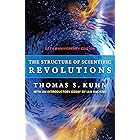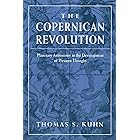Learn more
These promotions will be applied to this item:
Some promotions may be combined; others are not eligible to be combined with other offers. For details, please see the Terms & Conditions associated with these promotions.
Your Memberships & Subscriptions

Download the free Kindle app and start reading Kindle books instantly on your smartphone, tablet, or computer - no Kindle device required.
Read instantly on your browser with Kindle for Web.
Using your mobile phone camera - scan the code below and download the Kindle app.

The Last Writings of Thomas S. Kuhn: Incommensurability in Science Kindle Edition
This book contains the text of Thomas S. Kuhn’s unfinished book, The Plurality of Worlds: An Evolutionary Theory of Scientific Development, which Kuhn himself described as a return to the central claims of The Structure of Scientific Revolutions and the problems that it raised but did not resolve. The Plurality of Worlds is preceded by two related texts that Kuhn publicly delivered but never published in English: his paper “Scientific Knowledge as Historical Product” and his Shearman Memorial Lectures, “The Presence of Past Science.” An introduction by the editor describes the origins and structure of The Plurality of Worlds and sheds light on its central philosophical problems.
Kuhn’s aims in his last writings are bold. He sets out to develop an empirically grounded theory of meaning that would allow him to make sense of both the possibility of historical understanding and the inevitability of incommensurability between past and present science. In his view, incommensurability is fully compatible with a robust notion of the real world that science investigates, the rationality of scientific change, and the idea that scientific development is progressive.
Customers who bought this item also bought
Editorial Reviews
Review
"The Structure of Scientific Revolutions (1962) by philosopher of science Kuhn is ‘indispensable reading for every well-educated person,’ writes philosopher Mladenović in her introduction to this collection. She presents unpublished drafts of a reworking of Structure’s philosophical framework, with the texts of two lectures not previously published in English. Together, these explore whether historians can understand past scientific paradigms, even though these are incommensurable with present science." -- Andrew Robinson ― Nature
"The Last Writings pave the way for the development of new approaches by epistemologists, providing useful philosophical tools. More generally, this collection gives elements of answers to classical problems, such as the relationship between language and the world or the status of truth in science." -- Alexandre Francq and Sylvain Billiard ― Quarterly Review of Biology
“Combining Kuhn’s unfinished last book, The Plurality of Worlds, with two related works not previously available in English, and a substantial and illuminating introduction by editor Bojana Mladenović, The Last Writings of Thomas S. Kuhn will be received as an absolute gem by philosophers of science, as well as by the wide swath of academics across the social sciences and humanities who revere Kuhn.” -- Cheryl Misak, Department of Philosophy, University of Toronto, author of "Frank Ramsey: A Sheer Excess of Powers"
"Mladenović . . . has done a great service with her new book The Last Writings of Thomas S Kuhn. Containing the unfinished draft of a book that Kuhn was still working on when he died in 1996, Last Writings brings much needed clarity to Kuhn’s philosophy and his understanding of how science develops. . . . Granted, Kuhn’s work was unfinished, but hopefully, the Last Writings will reinvigorate conversations about incommensurability for years to come." -- Gino Elia ― Physics World
"Kuhn’s seminal 1962 history The Structure of Scientific Revolutions gets a posthumous follow-up in this complex volume. . . . Mladenović provides a comprehensive and thoughtful introduction to the work. . . . Philosophy lovers . . . will find plenty to chew on." ― Publishers Weekly
"This book offers an editorial reconstruction of Thomas Kuhn's uncompleted final work, The Plurality of Worlds. . . Kuhn argues for a view of past and current science as empirically grounded and scientific change as rational, while retaining the insight that competing scientific paradigms are incommensurable. . . Recommended." ― Choice
“A fascinating sketch of Kuhn’s mature thought. . . . The proponents of competing paradigms may practice their trades in different worlds, but, as Kuhn was at pains to stress in his last writings, sometimes those worlds are closer than we think.” -- Paul Dicken ― Los Angeles Review of Books
"Readers can see Kuhn grappling with the differences between his own needs, as a philosopher and historian, and the needs of current scientists. . . . When we 'transition between worlds' today, many of us habitually presume that, in disagreements, our opponents are simply lying. Of course, this happens sometimes. But more common, I think, are interactions involving the Kuhnian difficulties of translation. One of the enduring lessons from Thomas Kuhn is that of just how difficult it is to imagine the mental lives of others, and of just how easily truths can be lost in their transit from one mind to another." -- David Kordahl ― 3 Quarks Daily
"Mladenović's edition of some of Kuhn’s last and most valuable writings is a gem for philosophers of science. . . . The writings of his last stage as a philosopher of science exhibit a profound awareness of the intricacies and consequences of his particular approach to the field. A careful reading of this volume shows this and many other interpretive keys for Kuhn’s philosophy of science. I hope that this brief summary of the volume will do as an invitation to read and reread this wonderful incomplete treatise. Kuhn’s thinking is still alive in these pages." -- Juan V. Mayoral ― Journal for General Philosophy of Science
"After being on the wish-list of many historians and philosophers of science for decades, The Last Writings of Thomas S. Kuhn are finally available and open to discussion for interested readers. . . . The editor obviously did detailed and hard work on the manuscripts, some of which were left unfinished and required substantial engagement with the pieces, notes, and a significant knowledge of Kuhn’s person, intention, and works. The editorial work is also reflected in the additional notes at the end of the volume—explaining some of Kuhn’s mysterious remarks, mistakes, or unfinished sections—and a short index. . . . Leaving plenty of space for further discussion and comparisons, one remains in a state of puzzlement when asked whether The Last Writings belongs to philosophy, sociology, or history of science, or perhaps to the even newer trends of history and philosophy of science. The sciences, including psychology, neurology, comparative anthropology, and cognitive enterprises, are marching forward, providing sufficient material for philosophers to engage with." -- Adam Tamas Tuboly ― Metascience
About the Author
Thomas S. Kuhn (1922–96) was the Laurance S. Rockefeller Professor of Philosophy at the Massachusetts Institute of Technology. His books include The Essential Tension; Black-Body Theory and the Quantum Discontinuity, 1894–1912; and The Copernican Revolution.
Excerpt. © Reprinted by permission. All rights reserved.
Product details
- ASIN : B09Z74FB98
- Publisher : The University of Chicago Press (November 30, 2022)
- Publication date : November 30, 2022
- Language : English
- File size : 3.2 MB
- Text-to-Speech : Enabled
- Screen Reader : Supported
- Enhanced typesetting : Enabled
- X-Ray : Not Enabled
- Word Wise : Enabled
- Print length : 352 pages
- Best Sellers Rank: #510,299 in Kindle Store (See Top 100 in Kindle Store)
- #515 in Natural History (Books)
- #523 in Earth Sciences (Kindle Store)
- Customer Reviews:
About the author

Thomas Kuhn (1922-1996)was professor emeritus of philosophy at the Massachusetts Institute of Technology. His many books include The Structure of Scientific Revolutions and Black-Body Theory and the Quantum Discontinuity, 1894-1912, both published by the University of Chicago Press.
Customer reviews
- 5 star4 star3 star2 star1 star5 star87%0%0%0%13%87%
- 5 star4 star3 star2 star1 star4 star87%0%0%0%13%0%
- 5 star4 star3 star2 star1 star3 star87%0%0%0%13%0%
- 5 star4 star3 star2 star1 star2 star87%0%0%0%13%0%
- 5 star4 star3 star2 star1 star1 star87%0%0%0%13%13%
Customer Reviews, including Product Star Ratings help customers to learn more about the product and decide whether it is the right product for them.
To calculate the overall star rating and percentage breakdown by star, we don’t use a simple average. Instead, our system considers things like how recent a review is and if the reviewer bought the item on Amazon. It also analyzed reviews to verify trustworthiness.
Learn more how customers reviews work on AmazonTop reviews from the United States
There was a problem filtering reviews. Please reload the page.
- Reviewed in the United States on March 16, 2024Good causal read.











